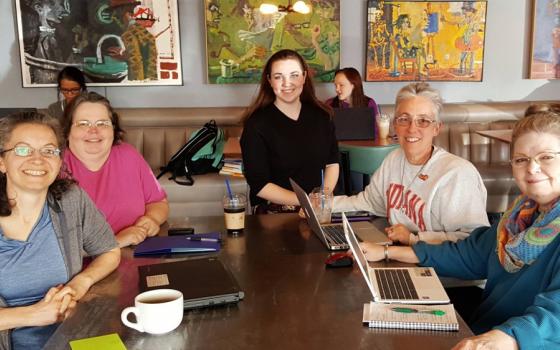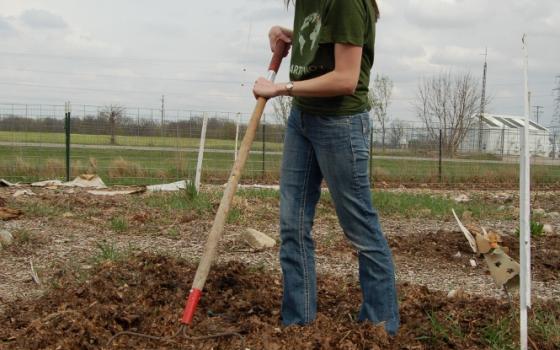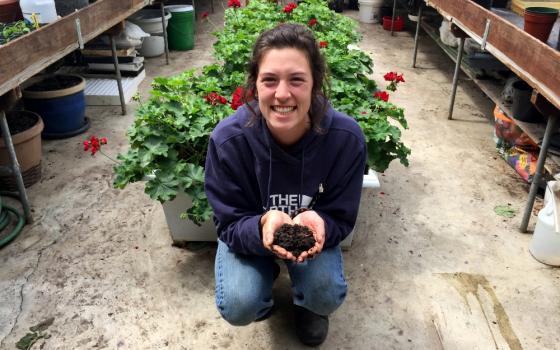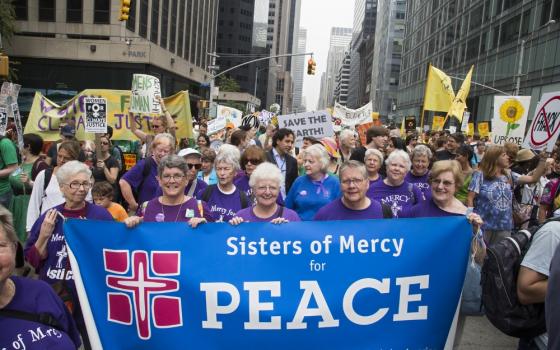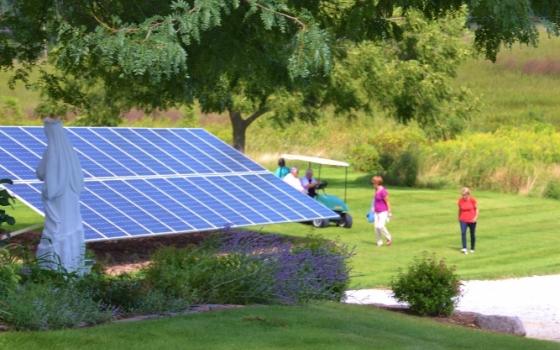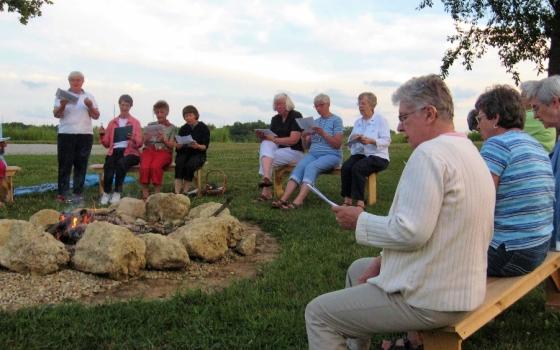When you think about women religious, the word "science" may not be the first to spring to mind. After all, faith and science are often portrayed as opposites, allegiance to one suggesting a betrayal of the other.
But for many if not most Catholic sisters, the calculations, experiments and observations that have shaped climate study and other scientific disciplines are facts that bolster their conviction that all life on Earth is interdependent, and that the time to intervene on behalf of a struggling planet is now.
That explains why, in part, women religious, volunteers and other community associates are traveling to Washington, D.C., for the People's Climate March on April 29 or already took part in the March for Science there a week earlier. Many are participating in local marches, too.
"Science helps us understand the world around us," says Sr. Barbara Battista, a member of the Sisters of Providence of Saint Mary-of-the-Woods, Indiana. "Faith in general can help us understand that there is so much we'll never understand about this journey in life. Science helps us get little glimpses of … the immensity and therefore the potential for life. We are all connected. … What happens to one happens to all of us."
Long before Pope Francis embraced the science behind climate change in his 2015 encyclical "Laudato Si': On care for Our Common Home," Catholic sisters were blazing trails in the hard sciences. Four nuns in the late 19th century worked with astronomers to help map the stars. In 1965, the late Sr. Mary Kenneth Keller, a Sister of Charity of the Blessed Virgin Mary of Dubuque, Iowa, is recognized as the first American woman to earn a doctorate in computer science. Sr. Mary Celine Fasenmyer, a Sister of Mercy, was a mathematician famed for her work on hypergeometric functions.
Before a diagnosis of multiple sclerosis mandated a change of calling in 1971, Sr. Margaret Knoeber, a member of the Adorers of the Blood of Christ in Wichita, Kansas, had earned a doctorate in organic chemistry at Notre Dame University, and founded the chemistry department at Sacred Heart College (now Newman University).
"I believe in science and the study of science, the teaching of science, because science is a significant aspect of our lives," says Knoeber, who went on to have a long and fruitful career with the university and as a leader in her own order. "I'm not aware that Catholics I know have any difficulty with science."
Battista, who participated in one of the satellite versions of the March for Science on April 22, says that she has been inspired by an unlikely role model: a man imprisoned by the Catholic Church for his outspoken, persistent defense of the Copernican hypothesis that the Earth circles the sun.
"Galileo has been my hero within the Catholic Church for as long as I can remember. He stood his ground against some pretty short-sighted teachings of the church that ultimately were corrected," says Battista, who helped organize the Wabash, Indiana, version of the science march. "The Catholic Church has yet to recognize the full humanity of women. To me, that's a breakdown of biological science — to me there should be no distinction."
Sr. Joan Baustian, a member of the Adrian Dominican Sisters based in Adrian, Michigan, is part of a group of eight community members planning to attend the 2017 People's Climate March in Washington.
As a child, she says, she grew up on a farm. But for 27 years she lived in Detroit, where part of her work was helping residents create and tend a community garden. Spurred by her concern over proposed severe cuts to the Environmental Protection Agency's budget and other Trump administration proposals, Baustian says that she hopes that the groups gathering in Washington and around the country on April 29 will influence decisions being made by lawmakers.
"The climate was made by God, and we're destroying it," she says. "If you believe what's in the Bible, we were made stewards of this wonderful Earth, of all these resources, and we're poisoning it."
Baustian's order, which has made a commitment to "live simply and sustainably for the sake of the whole Earth community," has a long history of environmental activism that includes alternative investing, interfaith alliances and physical changes to their campus and community life.
These measures include the establishment of a permaculture site on their campus. Using social and ecological principles, permaculture is designed to imitate the relationships found in the natural world.
The focus of the permaculture philosophy is "working with nature instead of against it," says Dominican volunteer program member Holly Sammons. Currently working with the Adrian Dominicans Peace Justice and Care of Creation Office, the 2014 college graduate is part of the group traveling to Washington for the Climate March.
"This is a way for me to add my voice to people calling for positive change to environmental policies and to learn from more experienced activists," says Sammons. She's also impelled to march, she says, by her concern for "climate refugees" — those forced out of their regions by droughts, rising sea levels or temperatures. "It's only going to get worse if we continue down the path we have been going," she says.
Sammons, who is Catholic, says she has been inspired both by the pope's encyclical and by the deliberate ways in which the Dominican Sisters are trying to mitigate their own environmental footprint.
Permaculture specialist Elaine Johnson, a staff member in the Adrian Dominican community, says she wasn't raised in any particular faith community. Describing herself as "having a reverence for life, and being pro-life in all life forms," Johnson says that she hopes to tap into the power of the network of activists descending on Washington April 29. "It is a protest march, but I like to think of it as an action march. You can protest and resist … and come back and do local action."
Kathy Quick, a Sister of Mercy associate, is planning to travel to the D.C. march from her home in Clifton Park, New York, in the company of a sister and two other associates. "I'm trying to be optimistic, that [the march] will bring to the forefront that this is a real issue; it's not going to go away. People are very concerned. We're demanding action," says Quick, a U.S. Air Force veteran, whose professional interest in climate change derives from her past career as a weather forecaster.
In partnership with the Global Catholic Climate Movement, the Sisters of Mercy have been public advocates for an assertive approach to redressing the effects of climate change as part of their approach to the care of the Earth.
The Friday before the climate march, Sr. Maryann Agnes Mueller, Justice and Peace Coordinator for the Felician Sisters of North America, planned to be part of a lobbying group organized by the Global Catholic Climate Movement, though as a Connecticut resident, she says that her senators are both already involved in legislation to cope with the effects of climate change. The next day she planned to march with the Franciscan Action Network.
As a Franciscan, she believes that everything is interconnected, and says, "How we treat the environment is a barrier to peace in the world." Recalling a New York march in 2014 before the U.N. Climate Summit, Mueller says that she felt more hopeful then. "It's just different this time. There is an urgency. We need to be out in the streets and show up because of the new political climate [and] to make people aware that this is affecting the poor, refugees, everything. We're going backwards."
While several women religious are attending marches because of concern about the global effects of climate change and the impact of national policy decisions, Sr. Kathleen Storms, a School Sister of Notre Dame*, brings the conversation back to local concerns. As a staff member at Our Lady of the Prairie Retreat, the ministry that the Congregation of the Humility of Mary operates in the countryside of east central Iowa, Storms runs the 200-acre farm. At the retreat center, they raise vegetables in a garden and a greenhouse, use a bank of solar panels, and have put almost half of their acreage in a conservation reserve program to take the land out of production, she says.
In the Quad Cities area, where a local march will take place on April 29, one of the chief concerns is water quality and availability, she says. "Much of our water is polluted by runoff from the fields, and the rivers end up in the Mississippi, so water has ended up being one of our main issues," she says. Both the Congregation of the Humility of Mary and her own congregation are passionate about climate care, she says.
Storms, who hopes for a good turnout on Saturday (she and a local Benedictine sister are going to be handing out chocolate spheres covered with a foil image of the Earth), says that science is an ally, backing up their faith with facts.
"I don't see what science is telling us as any different from what our faith is telling us. We need to care for the Earth."
*An earlier version of this story gave the wrong order for Storms.
[Elizabeth Eisenstadt Evans is a religion columnist for Lancaster Newspapers, Inc., as well as a freelance writer.]
